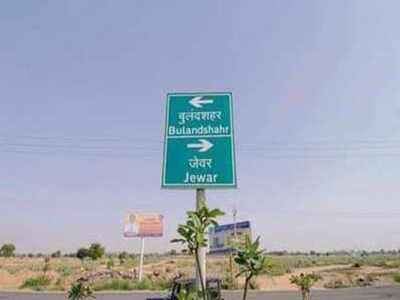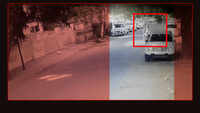
GREATER NOIDA: UP chief secretary Anup Chandra Pandey chaired the Greater Noida Industrial Development Authority (GNIDA)’s 114th board meeting on Friday, where a budget of Rs 4,260 crore was sanctioned for the financial year 2019-20, which is 17 % more than that last year. GNIDA’s budget for 2018-19 was Rs 3,639 crore, almost double than the Rs 1,745 crore allotted for 2017-18.
The budget laid stress on the Jewar airport project, with GNIDA allocating its share of Rs 300 crore for it. Connectivity formed a major part of the budget plans, and Rs 100 crore was cleared for the Noida-Greater Noida metro line. GNIDA put aside Rs 431 crore for internal and external development of the area, Rs 376 crore for urban city maintenance, Rs 200 crore for rural development and Rs 20 crore for horticulture development.
Linking Delhi with the metro formed a major part of the discussions during the meeting, officials said. A proposal was adopted in the board for a 14km Aqua Line connectivity from near Sector 142 in Greater Noida to Botanical Garden for an interchange to Delhi. “NMRC will be asked to construct the metro line and we will get a detailed project report (DPR) done jointly with the Noida Authority. The likely cost of the project will be between Rs 1,500 and Rs 2,000 crore,” said Narendra Bhooshan, GNIDA CEO.
Another 4 km metro connectivity was proposed from Greater Noida Depot station to Bodaki railway station to facilitate connectivity to the upcoming multi-model transport hub.
In terms of education, GNIDA decided to allow change of streams for professional institutes — for instance, an IT college can be run as a management institute too. The move is aimed at facilitating increased admissions and proper use of land.
Apart from these, GNIDA has set a target for 10,000 homes to be built under the Pradhan Mantri Awas Yojna. “Since these homes are built at a subsidy — costing about Rs 4.5 lakh each — we aim to balance the remaining cost by cross-subsidy. This includes facilities such as increase in FAR or extending commercial benefits to the builder to encourage homes under the PM Awas Yojna,” said Pandey. He, however, clarified that there will be no change in land rates in Greater Noida.
To generate revenue, GNIDA will begin online bids for 50 commercial plots, 40 shops, 6 petrol pumps and 11 milk booths. The board also approved a one-time settlement (OTS) scheme for clearance of pending water bills since March 31 this year. Under this, a provision of 40%, 30%, 20% and 10 % amnesty on interest arrears accrued will be given to consumers if they opt to clear water bills pending since March 31 through OTS within first, second, third and fourth month, respectively.
Further, under the city sanitation policy, the board sanctioned a decentralised solid waste management policy (DSWM), construction and demolition waste policy (CDW) and faecal sludge and septage management policy (FSSM).
While the reschedulement policy for all allottees was extended till August 31 this year, a sewage treatment plant with a capacity of 80 million litres per day (MLD) in Sector 1 in Noida Extension was cleared. The board also asked for all streetlights to be changed to LEDs. “An agreement with Energy Efficiency Services Ltd (EESL) will be signed for the change in streetlights,” said Pandey.
The budget laid stress on the Jewar airport project, with GNIDA allocating its share of Rs 300 crore for it. Connectivity formed a major part of the budget plans, and Rs 100 crore was cleared for the Noida-Greater Noida metro line. GNIDA put aside Rs 431 crore for internal and external development of the area, Rs 376 crore for urban city maintenance, Rs 200 crore for rural development and Rs 20 crore for horticulture development.
Linking Delhi with the metro formed a major part of the discussions during the meeting, officials said. A proposal was adopted in the board for a 14km Aqua Line connectivity from near Sector 142 in Greater Noida to Botanical Garden for an interchange to Delhi. “NMRC will be asked to construct the metro line and we will get a detailed project report (DPR) done jointly with the Noida Authority. The likely cost of the project will be between Rs 1,500 and Rs 2,000 crore,” said Narendra Bhooshan, GNIDA CEO.
Another 4 km metro connectivity was proposed from Greater Noida Depot station to Bodaki railway station to facilitate connectivity to the upcoming multi-model transport hub.
In terms of education, GNIDA decided to allow change of streams for professional institutes — for instance, an IT college can be run as a management institute too. The move is aimed at facilitating increased admissions and proper use of land.
Apart from these, GNIDA has set a target for 10,000 homes to be built under the Pradhan Mantri Awas Yojna. “Since these homes are built at a subsidy — costing about Rs 4.5 lakh each — we aim to balance the remaining cost by cross-subsidy. This includes facilities such as increase in FAR or extending commercial benefits to the builder to encourage homes under the PM Awas Yojna,” said Pandey. He, however, clarified that there will be no change in land rates in Greater Noida.
To generate revenue, GNIDA will begin online bids for 50 commercial plots, 40 shops, 6 petrol pumps and 11 milk booths. The board also approved a one-time settlement (OTS) scheme for clearance of pending water bills since March 31 this year. Under this, a provision of 40%, 30%, 20% and 10 % amnesty on interest arrears accrued will be given to consumers if they opt to clear water bills pending since March 31 through OTS within first, second, third and fourth month, respectively.
Further, under the city sanitation policy, the board sanctioned a decentralised solid waste management policy (DSWM), construction and demolition waste policy (CDW) and faecal sludge and septage management policy (FSSM).
While the reschedulement policy for all allottees was extended till August 31 this year, a sewage treatment plant with a capacity of 80 million litres per day (MLD) in Sector 1 in Noida Extension was cleared. The board also asked for all streetlights to be changed to LEDs. “An agreement with Energy Efficiency Services Ltd (EESL) will be signed for the change in streetlights,” said Pandey.
Elections 2019
Trending Topics
LATEST VIDEOS
More from TOI
Navbharat Times
Featured Today in Travel
Quick Links
Lok Sabha Election Schedule 2019Lok Sabha Election NewsDelhi Capitals teamMI team 2019Rajasthan Royals 2019RCB team 2019Maharashtra Lok Sabha ConstituenciesBJP Candidate ListBJP List 2019 TamilnaduShiv Sena List 2019AP BJP List 2019Mamata BanerjeeBJP List 2019 MaharashtraPriyanka GandhiBJP List 2019 KarnatakaAMMK Candidate List 2019BJP List 2019 WBLok Sabha Elections in Tamil NaduBSP List 2019 UPNews in TamilLok Sabha Poll 2019Satta Matka 2018PM ModiMahagathbandhanNagpur BJP Candidate ListChandrababu NaiduTamil Nadu ElectionsUrmila MatondkarNews in TeluguMadras High CourtTejashwi YadavArvind KejriwalTejasvi SuryaPawan KalyanArvind KejriwalYogi AdityanathJaya PradaSatta King 2019Srinagar encounter
Get the app







